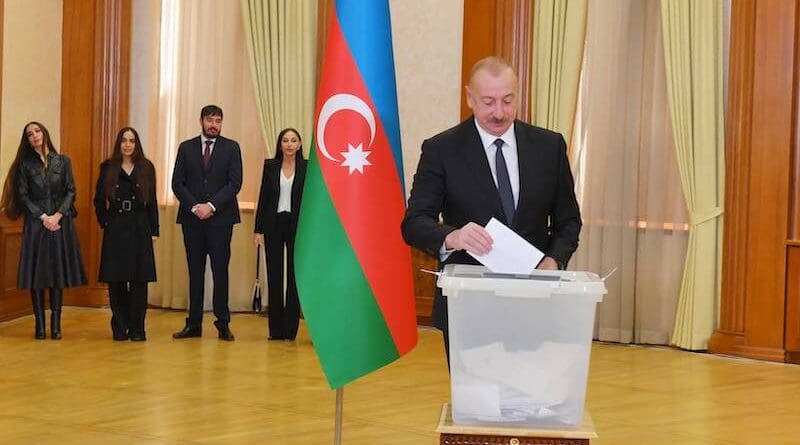Azerbaijan: Aliyev’s Victory Lap Election – Analysis
By RFE RL
By Joshua Kucera
(RFE/RL) — Azerbaijani President Ilham Aliyev’s choice of where to cast his vote said everything about why the country held an early presidential election Wednesday.
Shortly after the polls opened on February 7, Aliyev’s press service released video of the president, along with his wife and children, casting their ballots in a grand, high-ceilinged hall in Xankendi, known as Stepanakert in Armenian, the largest city in the Nagorno-Karabakh region.
Clearly confident of winning a fifth consecutive term in office in an election that watchdogs have said is neither free nor fair, Aliyev smiled and joked with the poll workers. Since taking over from his father, Heydar, in 2003, Aliyev has stifled dissent, cracked down on political opposition, and heavily restricted the media.
The question was never if Aliyev would win but by how much. In the last three presidential polls, he has never gotten less than 85 percent of the vote, and there was no indication that this vote would turn out any different.
The choice of venue was a potent symbol of what this election meant: Until last fall, the building served as the administration of a different “presidency” — the ethnic Armenian, de facto leadership of Azerbaijan’s breakaway region of Nagorno-Karabakh.
Those separatist, Armenian-backed forces had seized the mainly ethnic-Armenian-populated region from Azerbaijan during a war in the early 1990s that killed some 30,000 people. The two sides fought another war in 2020 that lasted six weeks before a Russia-brokered cease-fire.
Azerbaijan won back most of its territory in that war, and in September 2023, it launched a lightning offensive that resulted in the full capitulation of the de facto Karabakh government and the retaking of the rest of its territory.
It was the crowning moment of Aliyev’s 20-year presidency. In December 2023, when he announced that the presidential election would be moved up from its scheduled date of 2025, he justified the move in part because the victory in Karabakh would allow — for the first time in Azerbaijan’s postindependence history — elections to be held across the entirety of the country’s territory.
While there has been some halting resettlement of the territories that Azerbaijan won back in 2020, it wasn’t clear who would actually be around to vote in Xankendi.
Of the former ethnic Armenian population of Karabakh, nearly everyone — more than 100,000 people — fled after the September 2023 offensive. About 25 Armenians remained, and while they were occasionally featured in Azerbaijani pro-government media praising their new leadership, they were not seen on election day.
And many Azerbaijanis, other than soldiers and construction workers, have not had much time to arrive in Xankendi. Figures from Azerbaijan’s Central Election Commission (CEC) showed 7,805 voters registered in the city. That is up from 4,838 in the last presidential election in 2018. But that latter figure represented ethnic Azerbaijanis who were displaced in the war of the 1990s and who remained registered in their hometown. Nearly 3,000 newly registered voters have been added to the electoral roll since then.
The election commission reported that 26 polling stations were set up in the territories that Azerbaijan had won back since 2020. It wasn’t clear how many people were actually voting in them, though. The numbers that the CEC released throughout the day appeared to be a mix of displaced people voting from other parts of Azerbaijan and some newer arrivals.
But state and pro-government mediareleased footage of voting taking place in and around Karabakh, including photos of dozens of voters lined up at the Xankendi polling station that Aliyev had visited.
“I would like to thank President Ilham Aliyev for creating these conditions for us, and we are coming to vote in our hometown,” said Jala Oktayzade, a Xankendi native who is now the head doctor of the city’s hospital, in an interview with Azerbaijani media. “It is very gratifying that after many years we are exercising our right to vote here.”
- Joshua Kucera is a journalist living in Tbilisi. He also contributes to Eurasianet, The Economist, and other publications.

